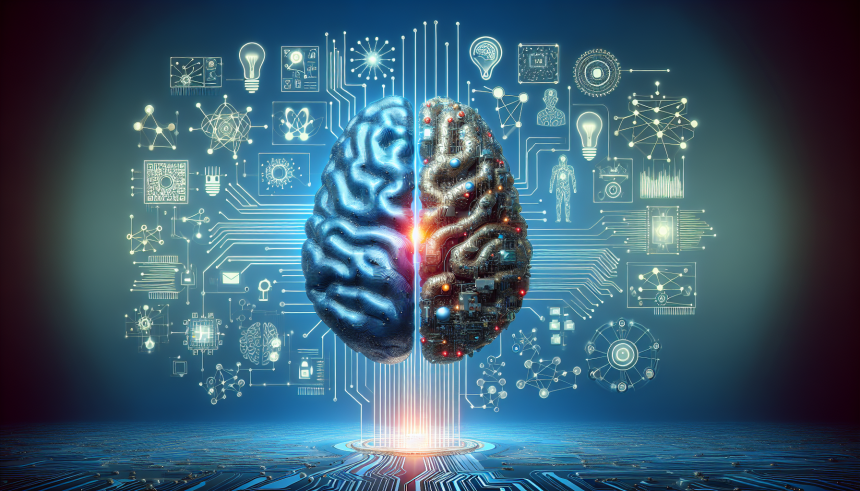Knowledge in AI: Concepts and Their Applications
Understanding Knowledge in AI
Artificial Intelligence (AI) aims to replicate human intelligence, integrating concepts of knowledge acquisition, representation, and reasoning. Knowledge in AI is characterized as facts, information, skills, or understanding that algorithms can process to perform tasks effectively.
Types of Knowledge
-
Declarative Knowledge: Also known as “know-that,” this refers to factual knowledge about the world. For AI, this can include databases enriched with factual information or ontologies providing structured relationships between concepts.
-
Procedural Knowledge: This is “know-how,” referring to processes or procedures required to perform certain tasks. Machine learning algorithms utilize this type of knowledge during training to predict outcomes and autonomously improve performance.
-
Meta-Knowledge: Knowledge about knowledge itself, it enables AI systems to understand when and how to use other knowledge types effectively. Meta-learning, for instance, allows algorithms to adapt their learning strategies based on prior experiences.
Knowledge Representation
Effective knowledge representation is vital for AI systems. Methods include:
-
Semantic Networks: Graph structures consisting of nodes (concepts) linked by edges (relationships), facilitating easy representation of knowledge.
-
Frames: Data structures that hold knowledge about objects, which allows the representation of stereotypical situations.
-
Logic-Based Representation: Uses formal logic to represent facts and relationships. Propositional and predicate logic provide a robust framework for reasoning.
Knowledge Acquisition
Knowledge acquisition refers to the process through which AI systems gather, refine, and structure knowledge. Techniques employed include:
-
Automated Learning: Involves using machine learning algorithms to process large datasets, identifying patterns that represent new knowledge.
-
Natural Language Processing (NLP): Allows AI to derive knowledge from human language, enabling understanding and context extraction from textual data.
-
Crowdsourcing: Engaging a large group of people to contribute knowledge, which can enhance the richness of datasets for training AI systems.
Applications of Knowledge in AI
1. Expert Systems
Expert systems are among the earliest applications of AI, designed to mimic human decision-making processes. These systems leverage extensive knowledge bases to provide solutions to specific problems. For instance, medical diagnostic systems analyze patient data and symptoms to offer potential diagnoses, drawing upon a vast library of medical knowledge.
2. Natural Language Processing
AI’s understanding of human language is crucial in applications like chatbots and virtual assistants. Knowledge representation allows these systems to interpret user intent, provide accurate responses, and learn from conversations. Tools like sentiment analysis utilize NLP to gauge emotional tone based on linguistic knowledge.
3. Robotics
In robotics, knowledge about the environment is essential for navigation and interaction. Robotic systems integrate sensory data with existing knowledge to make decisions in real-time. For example, autonomous vehicles employ knowledge of traffic laws and road conditions to drive safely.
4. Recommender Systems
Platforms like Netflix and Amazon deploy recommender systems that analyze user behavior and preferences. By representing this information as knowledge, these systems can suggest content, products, or services tailored to individual users. Collaborative filtering techniques enable these systems to leverage shared tastes among large audiences.
5. Knowledge Graphs
Knowledge graphs represent knowledge in a structured format, enhancing search engine functionality and output relevance. They link various concepts and entities, providing contextual information and relationships. Google’s Knowledge Graph is a prominent example, enhancing search results with pertinent information about people, places, and things.
6. Game AI
In gaming, knowledge representation underpins decision-making by AI-controlled characters. Using search algorithms and a structured representation of game rules, AI can strategize effectively, whether in chess, real-time strategy games, or complex simulations.
Challenges in Knowledge in AI
Despite advances, challenges exist in the utilization of knowledge in AI. Issues such as knowledge representation ambiguity, the dynamic nature of knowledge, and ethical considerations surrounding data privacy and bias warrant attention. Ensuring the integrity and accuracy of the knowledge utilized by AI systems is paramount in fulfilling their intended functions.
The Future of Knowledge in AI
Knowledge in AI will continue evolving with advancements in technology. Innovations like quantum computing and improved algorithms promise to enhance the efficiency of knowledge processing. Furthermore, the integration of human-like reasoning through Cognitive AI can lead to more autonomous systems capable of understanding and manipulating knowledge contextually.
Conclusion
The domain of knowledge in AI encompasses a wide range of concepts crucial for the development and application of intelligent systems. From expert systems to robotics, the representation, acquisition, and processing of knowledge underpin functionality across multiple sectors. Continued exploration and innovation in this field promise to expand the capabilities of AI, opening pathways to more sophisticated and human-like decision-making systems.


